What happens when a Banksy appears?
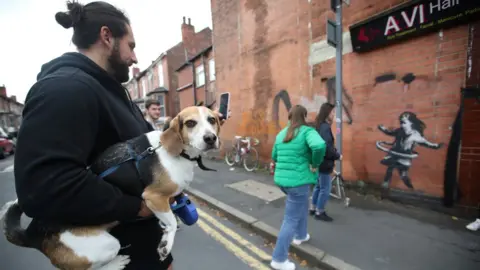 Reuters
ReutersNottingham is still buzzing from the arrival of a new Banksy artwork on the wall of a beauty salon - but a week on since he claimed it, what is next for the piece?
The artwork has become a source of pride and excitement for the city, with dozens queuing daily for a photo with the hula-hooping girl.
It is also theoretically worth a fortune - on Wednesday his Show me the Monet painting sold for £7.5m - although the brick wall Nottingham's piece is painted on would be more difficult to sell.
We look back at the often chequered history of Banksy's artwork to see what can happen when one shows up in a city.

Is it safe from vandals and thieves?
Unsurprisingly, given their potential value and public locations, Banksy works have often been targeted by criminals.
In January 2019, a hooded group used angle grinders to remove a piece from the Bataclan music hall in Paris.
The artwork, which showed a young female figure with a mournful expression, had been painted as a tribute to the victims of the 2015 terror attack at the venue.
It was found in Italy earlier this year.
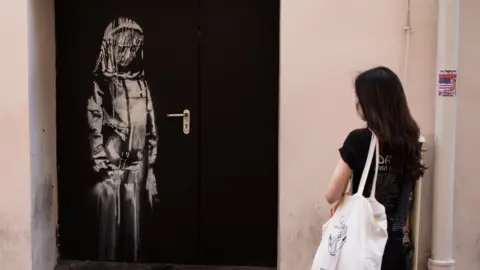 Getty Images
Getty ImagesA wall mural spelling out "to advertise here call 0800 Banksy" was removed piece by piece from a wall in Brick Lane, London, in 2007.
Vandals targeted the Nottingham piece within hours of it being painted.
Putting it somewhere safe would require removing a piece of wall from a private building and potentially the sign the bike is attached to - a major job which would need the owner's consent.
The council opted to put up a Perspex screen, which is an option that has been used by other authorities in the past.
So far this and regular monitoring have prevented any permanent damage, but whether it is the long-term solution remains to be seen.
Who owns it?
The tenants of a building in Payers Park, Folkestone, thought they had fallen on their feet when Banksy created a mural called Art Buff on it in 2014.
The work showed a women staring at an empty plinth - with vandals adding a penis shortly after it appeared.
The tenants shipped it to the US two months later and put it up for sale, but following an intervention by the building's owner, a High Court judge ruled it should return.
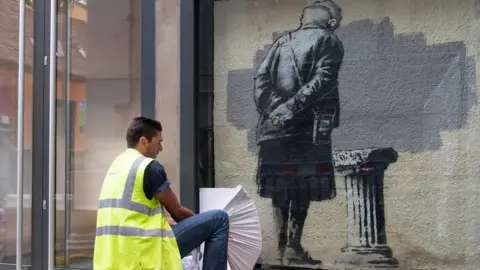 PA Media
PA MediaThe same year a row broke out between a boys' club in Bristol and the city council over who owned a piece Banksy had painted on a wall.
Banksy, who grew up in Bristol, wrote to the club to say it was theirs and it was sold to a private collector for £403,000.
According to Ben Brown, a solicitor at the Nottingham-based Bhatia Best law firm, the copyright for the artwork remains with Banksy - but the owner of the wall (in Nottingham's case, a private landlord) is free to do what he or she wants with it.
"Personally, I hope they choose to keep it," he added.
"If Nottingham City Council do not own the building, then they have limited powers to remove it or to make a claim of ownership."
Could it be removed?
Removing the wall and taking it somewhere safer would be possible, according to Andy Mann, owner of AMSD, a local structural engineering company.
He said it would be a "heavy operation" involving support for the bricks to prevent it falling apart on removal.
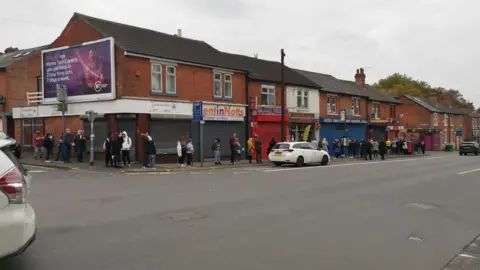
He added: "It's not very common to try and extract the wall intact. And anyone working on a Banksy will be using a lot more care than usual - no-one wants to be the one who rushed that job.
"But it would be possible."
There is a debate around whether or not such art should be left in its original position, as Banksy intended.
Several pieces have been taken from their original walls by private sellers, in some cases controversially.
The council did not comment when asked if this was something it was considering.
What about unwitting cover-ups?
On more than one occasion, Banksy's works have been accidentally removed, obscured or painted over by public servants.
Earlier this year, a work called If You Don't Mask, You Don't Get was cleaned off a Tube train by Transport for London (TfL) cleaning crews.
A TfL source told the BBC: "It was treated like any other graffiti on the network."
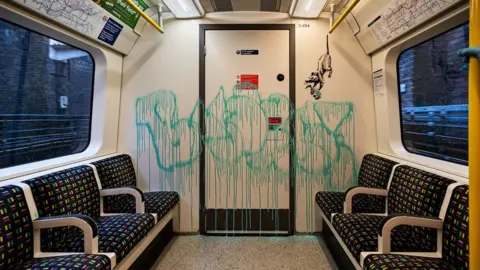 JBPR/PA
JBPR/PAOne of his earliest works in Bristol - showing a gorilla in a pink mask - was whitewashed by the owner of the North Bristol Social Club in 2011.
He had been unaware of the piece's significance. The work was partially restored before being mysteriously removed last month.
Given the prominence of Nottingham's piece and the lengths the council has gone to protect it, this scenario seems unlikely.
So what will happen in Nottingham?
Surinder Kaur, who owns the salon but not the building, said she was enjoying seeing people walk past smiling and hoped it could stay in place or be taken to a museum for protection.
She said: "Everyone is so excited. But it's already been attacked twice and the Perspex is getting scratched so the art is not so clear.
"It needs looking after."
The owner of the building has so far declined to speak on the record to the BBC about his future plans.
The city council, for its part, said it was seeking advice on what to do next.
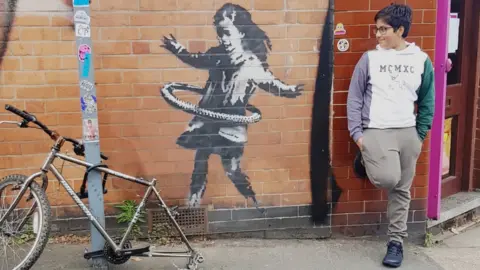 Surinder Kaur
Surinder KaurFor now, we will just have to wait and see what becomes of the city's newest and perhaps already most famous piece of public art.
But then again, maybe we should learn from the piece and, like the hula-hooping girl, just enjoy what we have in the moment.

Follow BBC East Midlands on Facebook, Twitter, or Instagram. Send your story ideas to [email protected].
